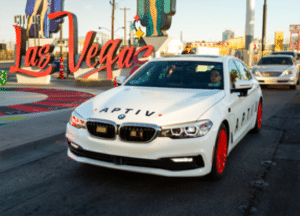
Lyft Inc. sold its autonomous vehicle technology unit, Level 5, to Toyota Motor Co. for $550 million, following the lead of its rival, Uber Inc.
The company launched Level 5 in 2017 to build a self-driving system for its network of vehicles. The goal, ultimately, was to eliminate the need for drivers. The company grew to nearly 400 employees, but as Lyft continues to lose money overall, it needed to find ways to end its string of quarterly losses.
Not only will it get $550 million from Toyota, it will also stop funneling multiple millions of dollars into a development project with no finish line in sight for a payoff. Lyft gets $200 million immediately and the remaining $350 million will be paid in installments during the next five years.
Uber finalized a similar deal last fall, selling its autonomous vehicle unit called Advanced Technology Group to Aurora led by former Waymo chief Chris Urmson for $400 million.
Immediate financial relief

The ride-hailing company said selling its Level 5 subsidiary puts it back on the path to profitability. First and foremost, it cuts $100 million of annualized non-GAAP operating expenses on a net basis, Co-founder and President John Zimmer noted in the announcement.
“Assuming the transaction closes within the expected timeframe and the COVID recovery continues, we are confident that we can achieve Adjusted EBITDA profitability in the third quarter of this year,” Zimmer said in a statement.
The company isn’t getting out of the robotaxi business. It’s already partnered with Motional and Waymo to develop self-driving tech and now it will just rely on that partnership to move toward autonomous vehicles. Working with the pair, Lyft’s already provided more than 100,000 self-driving rides in its vehicles in the last three years.
However, Lyft can now focus on what it can do best with autonomous vehicles by offering services such as routing, consumer interface and managing, and maintaining and cleaning partners’ autonomous vehicle fleets, which could mean added revenue, it said.
Uber made a similar choice
Lyft’s deal is similar to Uber’s move last December to sell its Advanced Technology Group, or ATG, to Aurora, the autonomous vehicle technology company founded by Google and Waymo veteran Chris Urmson. The deal came in at $400 million.

AVs were a critical component of the path to profitability by Uber, which now relies on part-time drivers or gig workers to ferry passengers, using its celebrated phone app. Uber invested huge sums in its internal AV project; however, was crippled in 2018 when one of its test vehicles struck and killed a pedestrian in Tempe, Arizona. It never really recovered.
Uber also ended up with a 26% ownership interest in Aurora on a fully diluted basis, the company said in a filing.
Aurora and Uber agreed to collaborate to launch self-driving vehicles on its ride-hailing and food delivery network. Uber is also working on building out its freight logistics platform but is not operating its own trucks at present.
The completion of the deal caused Uber’s CEO Dara Khosrowshahi to utter a familiar refrain to Reuters: “This essentially advances our path to profitability.” He said the deal should put the company on track for profitability by the end of this year, largely due to the fact Uber would no longer be investing vast sums of cash into ATG.







